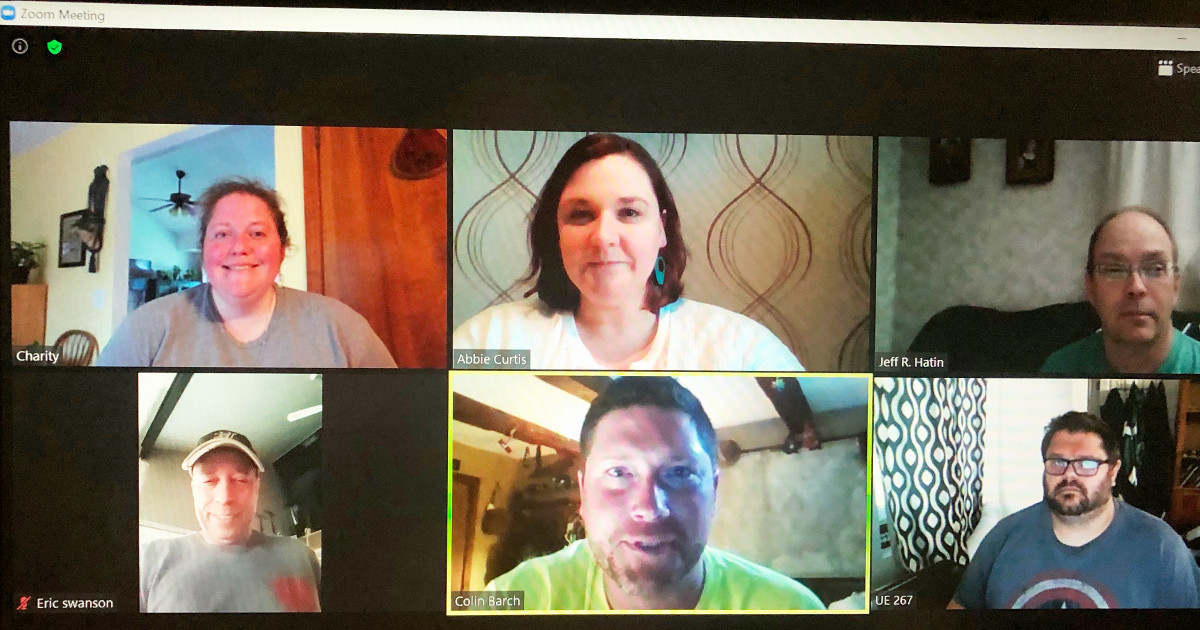
Pictured Above: The Local 6267 Negotiating Committee meeting over Zoom. Clockwise from top left: Charity Dugener, Abbie Curtis, Jeff Hatin, Mike Wells, Colin Barch, Eric Swanson.
Burlington, VT
June 4, 2021
The leadership of UE Local 267, which represents service and maintenance workers at the University of Vermont, had spent months preparing for their next round of negotiations — and then the COVID-19 pandemic hit, leading to what Local 267 Vice President Charity Dugener called an “unprecedented bargaining experience.”
With the employer taking advantage of the uncertainty caused by the pandemic to demand concessions, the local pivoted to protecting, preserving and maintaining their contract.
“UVM sought cuts and concessions like we had never seen before,” said Dugener, “all while our membership kept UVM safe and operational during this once-in-a-lifetime pandemic.”
The university administration imposed pay cuts on non-union staff (later rescinded, after those workers began organizing with another union), and demanded the same of Local 267, along with a “mountain” of other concessions.
Most shockingly, the administration proposed reducing employer contributions to the retirement plan to zero for the life of the contract. They also sought limits on the ability of workers and their families to receive free tuition at the university — one of the primary reasons why many Local 267 members choose to work there in the first place.
To add insult to injury, the administration alleged that UE members look “unprofessional,” and demanded they not only wear uniforms at work, but take on the labor and expense of laundering their own uniforms. Local 267 members come from all over the world (Burlington is home to a federal refugee resettlement program), and many wear traditional clothing with cultural or religious significance. The UE local forcefully rejected any suggestion that such clothing was in any way “unprofessional.”
In one area, the administration did propose improvements — but only for some. Clearly feeling pressure from the popular movement for a $15 minimum wage, they proposed to raise the wages of the lowest-paid workers in the bargaining unit, but to pay for it by cutting wages for workers in higher pay grades.
The members of Local 267 rejected this divide-and-conquer tactic. At membership meetings held during bargaining, they voted to pursue wage increases as across-the-board dollar amounts, which would especially benefit lower-wage workers but without cutting the pay of higher-earning workers. “During our final push for our contract the membership came together in one voice and said they supported a flat across the board raise because we were all in this together,” said Local 267 President Mike Wells. “For that I am eternally grateful.”
Maintaining unity in this way paid off. The final agreement, reached in April, will bring all workers up to the $15 minimum without any cuts to pay or benefits.
The three-year contract raises the wages for all workers earning less than $15 per hour to $15 retroactive to January 1, 2021, with equity adjustments for workers making up to $17 an hour. For everyone else, there is a one-time $300 bonus. All workers will receive a 35 cent wage increase on July 1, 2021, and a 50 cent wage increase on July 1, 2022.
Employer contributions to the retirement plan will remain the same, and tuition reimbursement, rather than being limited, will be expanded to cover certain job-related classes or professional certification programs. Workers will not be required to wear uniforms.
The new contract adds a second cultural holiday, a particularly important win for a diverse workforce whose members come from a wide variety of cultural and religious backgrounds. Workers with 15 or more years of service will also receive a third personal day.
New language on lateral transfers creates a grace period during which a worker who accepts a lateral transfer can return to their previous position. On-call pay will increase to $20 per day, and $140 per week, and the clothing, shoe and eyewear reimbursement will increase to $200 per fiscal year.
Bereavement leave will improve, with an additional three days of paid bereavement leave granted for the loss of a spouse, civil union partner, child/stepchild, grandchild, or parent/step-parent. An additional two days of paid bereavement leave will be granted for the loss of a brother or sister if the employee needs to be involved in making funeral arrangements, selling the estate, or similar reasons.
“Our membership is the backbone of this university community and our collective efforts within this community kept it open and contributed to the successful completion of the academic year,” said Dugener. “We were happy to be able to bring them a well-defended contract, wherein the lowest-earning among us will be brought to $15 per hour while still making fair gains for all.”
“I am immensely proud of the work our bargaining team did,” added Wells. “When faced with massive concessions, we not only fought them off, we made financial and quality-of-life gains. This would have not been possible without the support from our rank-and-file brothers and sisters.”
The Local 267 negotiating committee consisted of President Mike Wells, Vice President Charity Dugener, Treasurer Colin Barch, Recording Secretary Eric Swanson, and Member at Large Jeff Hatin. They were assisted by Field Organizer Abbie Curtis.
